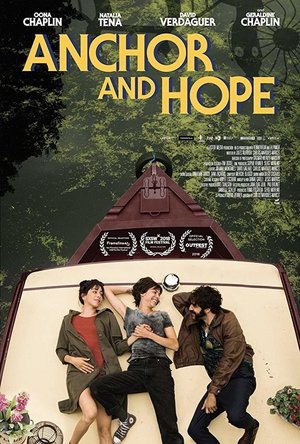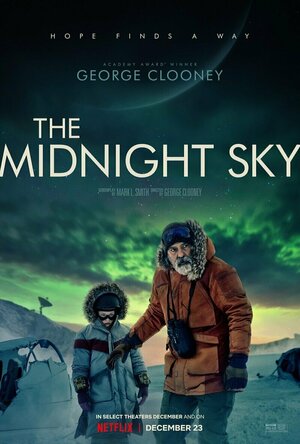Search

DayGram - One line a day Diary (Note/Journal)
Lifestyle
App
How was your day? Write your story on the Daygram. Daygram is a simple, electronic-ink-themed...
Lucy Buglass (45 KP) rated Anchor & Hope (2018) in Movies
Jun 20, 2019
A heart-wrenching portrait of parenthood & sexuality
Deciding to have a baby is a big step in many couples’ lives, but sometimes, things don’t always go according to plan. Carlos Marques-Marcet’s Anchor and Hope follows two lesbian women who, one drunken night, decide to use their friend’s sperm in order to have a child of their own. It’s not a decision that should be taken lightly, but makes for an interesting story nonetheless. Insemination is a viable option that is often considered by those in same-sex relationships, or by those who struggle to conceive. This is the first film I’ve seen that deals with the subject so explicitly.
Throughout the course of the film, we focus heavily on the lives of Eva, Kat and Roger. The quality of acting was very good and believable, meaning it was easy for me to stay invested in their lives as events transpired. They all have very different personality traits that inevitably clash, and it’s not long before jealousy starts to rear its ugly head and tensions rise. Kat and Roger are close and both fluent in Spanish, meaning they’re able to communicate and Eva hasn’t got a clue what they’re saying. She starts feeling left out, which may or may not have driven her to think about the insemination. It’s left up to the audience to figure that one out. It’s clear Eva wants the baby more than Kat does, which is already a huge red flag.
The baby becomes a central part of the narrative, and the character’s lives. Anchor and Hope presents us with different viewpoints, all centred around this new life. It’s incredibly emotional to watch as we witness how three very different characters respond to it. I respected the fact the film doesn’t position itself as for or against any argument, it simply presents them to the audience as valid responses to what’s happening. Had the film gotten too preachy one way or the other, I think I may have found that frustrating. This is a film that leaves a lot up to the audience, and one that can spark interesting discussions.
Despite my interest in the topic and praise for the acting, I didn’t particularly like any of the characters. They’re all frustrating in their own ways and sometimes it felt a little too far-fetched and melodramatic. This weakened the film for me as I didn’t find myself rooting for anyone, and just wished they’d never made that decision in the first place. There’s no warmth for any of the characters, which was a let down. I also felt the story could have been shorter and snappier, as it felt too drawn out in places.
However, it is a very interesting look into insemination and sperm donors, and the script is strong and considered. It would be easy to cause controversy if not dealt with respectfully, but I felt like appropriate research had been done and they remained impartial throughout. The visuals are clean, well shot, and I liked the use of small, intimate locations to tell the story. Eva and Kat live on a houseboat, so that sense of minimalism is present throughout.
I was mostly entertained and enjoyed watching it, so I would recommend this film if it’s a topic that interests you. Overall, it’s an emotionally charged and well-written LGBT+ film and we definitely need more of those.
https://lucygoestohollywood.com/2018/11/08/anchor-and-hope-a-heart-wrenching-portrait-of-parenthood-sexuality/
Throughout the course of the film, we focus heavily on the lives of Eva, Kat and Roger. The quality of acting was very good and believable, meaning it was easy for me to stay invested in their lives as events transpired. They all have very different personality traits that inevitably clash, and it’s not long before jealousy starts to rear its ugly head and tensions rise. Kat and Roger are close and both fluent in Spanish, meaning they’re able to communicate and Eva hasn’t got a clue what they’re saying. She starts feeling left out, which may or may not have driven her to think about the insemination. It’s left up to the audience to figure that one out. It’s clear Eva wants the baby more than Kat does, which is already a huge red flag.
The baby becomes a central part of the narrative, and the character’s lives. Anchor and Hope presents us with different viewpoints, all centred around this new life. It’s incredibly emotional to watch as we witness how three very different characters respond to it. I respected the fact the film doesn’t position itself as for or against any argument, it simply presents them to the audience as valid responses to what’s happening. Had the film gotten too preachy one way or the other, I think I may have found that frustrating. This is a film that leaves a lot up to the audience, and one that can spark interesting discussions.
Despite my interest in the topic and praise for the acting, I didn’t particularly like any of the characters. They’re all frustrating in their own ways and sometimes it felt a little too far-fetched and melodramatic. This weakened the film for me as I didn’t find myself rooting for anyone, and just wished they’d never made that decision in the first place. There’s no warmth for any of the characters, which was a let down. I also felt the story could have been shorter and snappier, as it felt too drawn out in places.
However, it is a very interesting look into insemination and sperm donors, and the script is strong and considered. It would be easy to cause controversy if not dealt with respectfully, but I felt like appropriate research had been done and they remained impartial throughout. The visuals are clean, well shot, and I liked the use of small, intimate locations to tell the story. Eva and Kat live on a houseboat, so that sense of minimalism is present throughout.
I was mostly entertained and enjoyed watching it, so I would recommend this film if it’s a topic that interests you. Overall, it’s an emotionally charged and well-written LGBT+ film and we definitely need more of those.
https://lucygoestohollywood.com/2018/11/08/anchor-and-hope-a-heart-wrenching-portrait-of-parenthood-sexuality/
Kirk Bage (1775 KP) rated The Midnight Sky (2020) in Movies
Jan 22, 2021
As a movie star, which, let’s face it, is George Clooney’s main and best job, we haven’t seen the guy for four years, since the largely underwhelming Money Monster. And, as a director, you’d be forgiven for thinking he hasn’t done anything for years, so unmemorable was 2017’s Suburbicon, with Matt Damon. It is a worrying trend of his entire career, that despite some genuine gold, and even a few diamonds here and there over the years, there are way more duds, with large pockets of “meh” thrown in.
The Netflix original movie The Midnight Sky was never going to be met with very high expectations, therefore. Although, it is testament to gorgeous George’s allure that we are still curious to at least see for ourselves what all the poor reviews are about. It seemed to be unanimous around the big voices that the main issue is that “nothing happens”. This does not worry me normally, as it quite often demonstrates how a 2020s audience, especially a Netflix one, has the attention span of a hungry vole in search of a fast worm followed by a quick nap! Patient story building and minimalism are not well regarded any more in the main. And that is a big problem for this film in finding an appreciative audience.
Clooney himself pitched it as Gravity meets The Revenant. Now, what you have done there, George, is set yourself up to be compared to two works of relative genius, both with far bigger budgets and the actual big screen in mind, not the “yes, it’s still a movie, but it is made for TV and phones” phenomenon. So it is bound to suffer in any critique. It didn’t stand a chance.
OK, it is ponderously slow. Fact. And there are moments when staring at Clooney’s extremely compelling beard is the most interesting thing to do with your brain or eyes in that moment. But to say nothing happens is erroneously unfair – Augustine is dying, and alone, in a world that has destroyed itself in an unspecified way. As he navigates a nightmare landscape of ice and his own diminishing sanity his subconscious creates an ethereal presence to guide him to his “essential” purpose: getting a message to a distant space station not to return to Earth under any circumstances.
Whilst not remotely original, and borrowing from the previously specified references in big, obvious ways (as well as Solaris, which GC didn’t mention, but its influence is apparent, both the Soderburgh and Tarkovsky versions), the heart of the idea isn’t anywhere near as weak as the naysayers would have you believe. If, in fact, you tune in to Clooney’s fine, sensitive performance, whilst reading between the lines of emotion and meaning, it is quite a satisfying tale. Yes, with a lot of problems, not least of all in momentum and the excitement you might expect from a sci-fi. But it isn’t “bad”, per se. Merely ponderous.
As for those up in space, including the always watchable and wonderful Felicity Jones, David Oyelowo, and Kyle Chandler, their lot is much more difficult than the Earthbound sequences. Caught between budget CGI and sets, and trapped in recreations of better space films, they simply don’t have the script to create any atmosphere or chemistry between themselves. Including an excruciating sing-along sequence that serves no purpose other than to make you cringe! The shame then is that we never feel like they are worth saving, which makes Augustine’s efforts feel futile and hollow – maybe something Clooney as director wanted to convey… but he shouldn’t have done it by making us care absolutely zero about those being saved.
Ultimately, it is an admirable failure in many ways, and not worth an earnest recommendation. It is another flop for Clooney as director. But there is just enough beauty and fragility in what Clooney is doing as an actor to make it far from a complete waste of time. Yes, it is a further example of Netflix producing something that feels churned out and corner cutting, rather than a fully rounded work that has all the framework a big cinema release would receive. It just isn’t quite as bad as the reviews suggest.
The Netflix original movie The Midnight Sky was never going to be met with very high expectations, therefore. Although, it is testament to gorgeous George’s allure that we are still curious to at least see for ourselves what all the poor reviews are about. It seemed to be unanimous around the big voices that the main issue is that “nothing happens”. This does not worry me normally, as it quite often demonstrates how a 2020s audience, especially a Netflix one, has the attention span of a hungry vole in search of a fast worm followed by a quick nap! Patient story building and minimalism are not well regarded any more in the main. And that is a big problem for this film in finding an appreciative audience.
Clooney himself pitched it as Gravity meets The Revenant. Now, what you have done there, George, is set yourself up to be compared to two works of relative genius, both with far bigger budgets and the actual big screen in mind, not the “yes, it’s still a movie, but it is made for TV and phones” phenomenon. So it is bound to suffer in any critique. It didn’t stand a chance.
OK, it is ponderously slow. Fact. And there are moments when staring at Clooney’s extremely compelling beard is the most interesting thing to do with your brain or eyes in that moment. But to say nothing happens is erroneously unfair – Augustine is dying, and alone, in a world that has destroyed itself in an unspecified way. As he navigates a nightmare landscape of ice and his own diminishing sanity his subconscious creates an ethereal presence to guide him to his “essential” purpose: getting a message to a distant space station not to return to Earth under any circumstances.
Whilst not remotely original, and borrowing from the previously specified references in big, obvious ways (as well as Solaris, which GC didn’t mention, but its influence is apparent, both the Soderburgh and Tarkovsky versions), the heart of the idea isn’t anywhere near as weak as the naysayers would have you believe. If, in fact, you tune in to Clooney’s fine, sensitive performance, whilst reading between the lines of emotion and meaning, it is quite a satisfying tale. Yes, with a lot of problems, not least of all in momentum and the excitement you might expect from a sci-fi. But it isn’t “bad”, per se. Merely ponderous.
As for those up in space, including the always watchable and wonderful Felicity Jones, David Oyelowo, and Kyle Chandler, their lot is much more difficult than the Earthbound sequences. Caught between budget CGI and sets, and trapped in recreations of better space films, they simply don’t have the script to create any atmosphere or chemistry between themselves. Including an excruciating sing-along sequence that serves no purpose other than to make you cringe! The shame then is that we never feel like they are worth saving, which makes Augustine’s efforts feel futile and hollow – maybe something Clooney as director wanted to convey… but he shouldn’t have done it by making us care absolutely zero about those being saved.
Ultimately, it is an admirable failure in many ways, and not worth an earnest recommendation. It is another flop for Clooney as director. But there is just enough beauty and fragility in what Clooney is doing as an actor to make it far from a complete waste of time. Yes, it is a further example of Netflix producing something that feels churned out and corner cutting, rather than a fully rounded work that has all the framework a big cinema release would receive. It just isn’t quite as bad as the reviews suggest.

